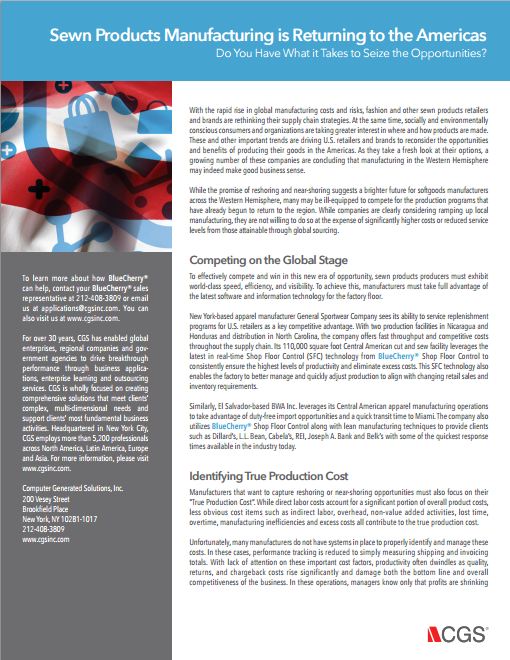 This whitepaper explores the rapid rise in global manufacturing costs and risks, and how fashion and other sewn products retailers and brands are rethinking their supply chain strategies.
This whitepaper explores the rapid rise in global manufacturing costs and risks, and how fashion and other sewn products retailers and brands are rethinking their supply chain strategies.
Manufacturing in the Western Hemisphere
At the same time, socially and environmentally conscious consumers and organizations are taking greater interest in where and how products are made. These and other important trends are driving U.S. retailers and brands to reconsider the opportunities and benefits of producing their goods in the Americas. As they take a fresh look at their options, a growing number of these companies are concluding that manufacturing in the Western Hemisphere may indeed make good business sense.
While the promise of reshoring and near-shoring suggests a brighter future for softgoods manufacturers across the Western Hemisphere, many may be ill-equipped to compete for the production programs that have already begun to return to the region. While companies are clearly considering ramping up local manufacturing, they are not willing to do so at the expense of significantly higher costs or reduced service levels from those attainable through global sourcing.
Competing on the Global Stage
To effectively compete and win in this new era of opportunity, sewn products producers must exhibit world-class speed, efficiency, and visibility. To achieve this, manufacturers must take full advantage of the latest software and information technology for the factory floor.
New York-based apparel manufacturer General Sportwear Company sees its ability to service replenishment programs for U.S. retailers as a key competitive advantage. With two production facilities in Nicaragua and Honduras and distribution in North Carolina, the company offers fast throughput and competitive costs throughout the supply chain. Its 110,000 square foot Central American cut and sew facility leverages the latest in real-time Shop Floor Control (SFC) technology from BlueCherry® Shop Floor Control to consistently ensure the highest levels of productivity and eliminate excess costs. This SFC technology also enables the factory to better manage and quickly adjust production to align with changing retail sales and inventory requirements.
Competitive Advantage
Similarly, El Salvador-based BWA Inc. leverages its Central American apparel manufacturing operations to take advantage of duty-free import opportunities and a quick transit time to Miami. The company also utilizes BlueCherry® Shop Floor Control along with lean manufacturing techniques to provide clients such as Dillard’s, L.L. Bean, Cabela’s, REI, Joseph A. Bank and Belk’s with some of the quickest response times available in the industry today.
 This whitepaper explores the rapid rise in global manufacturing costs and risks, and how fashion and other sewn products retailers and brands are rethinking their supply chain strategies.
This whitepaper explores the rapid rise in global manufacturing costs and risks, and how fashion and other sewn products retailers and brands are rethinking their supply chain strategies.